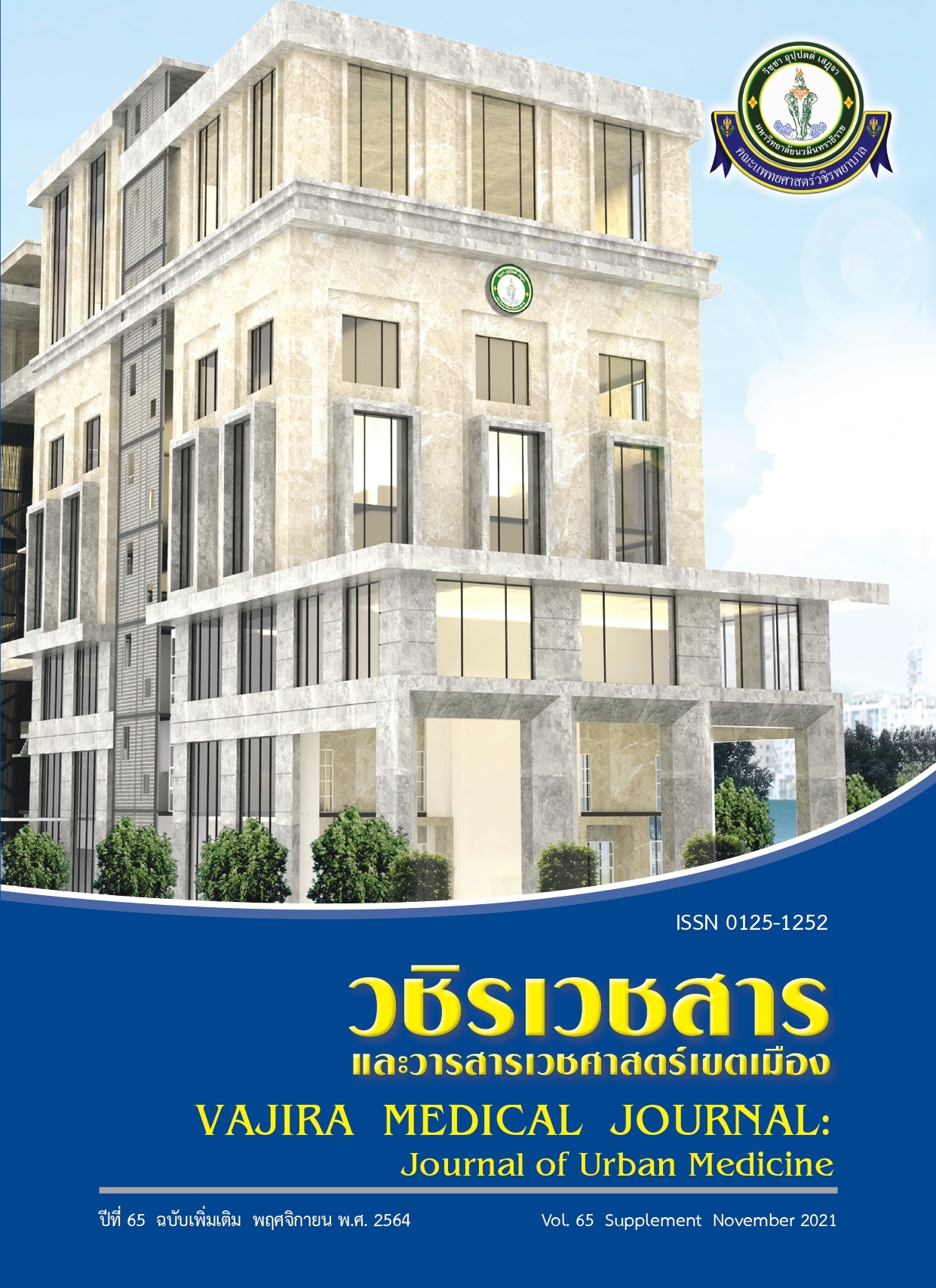The Association between Parenting Styles and Behavioral Problems in Children
Main Article Content
Abstract
Background: Behavioral problem was the common problem that had long-term effects on child’s performance. This study aimed to investigate the association between parenting style and child behavioral problems.
Methods: A cross-sectional study was conducted by using parenting style questionnaire and strengths and difficulties questionnaire (SDQ) to collect data from caretaker of children, aged 3-15 years old who were treated at Vajira Hospital. The prevalence of parenting styles and association between parenting styles and behavioral problems in children were analyzed by multiple linear regression.
Results: 198 participants were enrolled. Male caretaker was 52%, mean age was 38.45 ± 11.6 years old. Boy was 55.6%, mean age was 8.19 ± 2.72 years old. The prevalence of authoritative, permissive and authoritarian parenting style was 59.6%, 23.2% and 17.2%, respectively. The study showed significantly difference of total difficulties score among parenting style groups (p-value = 0.034). Linear regression analysis showed difficult or slow-to-warm up temperament ( = 0.196, t = 2.805, p-value = 0.006), birth order (
= -0.145, t = -2.052, p-value = 0.041) and authoritarian parenting style (
= -0.149, t= -2.106, p-value = 0.036) were factors that impact to child’s total difficulties score. When cofactor was controlling, difficult or slow-to-warm up temperament (
= 0.20, 95% CI = 0.96-3.62, p-value = 0.004) and birth order (
= -0.15, 95% CI= -1.84,-0.06, p-value = 0.037) were factors that still be a great impact significantly.
Conclusions: The most common parenting style was authoritative style. Parenting styles were associated with child behavioral score. Temperament and birth order were factor that impact to behavioral score.
Downloads
Article Details

This work is licensed under a Creative Commons Attribution-NonCommercial-NoDerivatives 4.0 International License.
References
Maneesang W. The behavioral problems of students in kindergarten and elementary schools in community area of Western University at Watcharapon campus [Internet]. Bangkok: Western University; 2017 [cited 2020 May 25]. Available from: https://oldweb.western.ac.th/media/attachments/2017/09/13/kinderkarten.pdf
Teekavanich S, Chantaratin S, Sirisakpanit S, Tarugsa J. Prevalence and Factors Related to Behavioral and Emotional Problems among Preschool Children in Bangkok, Thailand. J Med Assoc Thai 2017;100(2):175-82.
Rhucharoenpornpanich O, Chamratrithirong A, Fongkaew W, Rosati MJ, Miller BA, Cupp PK. Parenting and adolescent problem behaviors: a comparative study of sons and daughters in Thailand. J Med Assoc Thai 2010;93(3):293-300.
Ageranioti-Bélanger S, Brunet S, D'Anjou G, Tellier G, Boivin J, Gauthier M. Behaviour disorders in children with an intellectual disability. Paediatr Child Health 2012;17(2):84-8.
Charles J, Fazeli M. Depression in children. Aust Fam Physician 2017;46(12):901-7.
Saylor KE, Amann BH. Impulsive Aggression as a Comorbidity of Attention-Deficit/Hyperactivity Disorder in Children and Adolescents. J Child Adolesc Psychopharmacol 2016;26:19-25.
Totsika V, Hastings RP, Emerson E, Lancaster GA, Berridge DM. A population-based investigation of behavioural and emotional problems and maternal mental health: associations with autism spectrum disorder and intellectual disability. J Child Psychol Psychiatry 2011;52:91-9.
Hosokwa R, Katsura T. Effect of socioeconomic status on behavioral problems from preschool to early elementary school – A Japanese longitudinal study [Internet]. 2018 [cited 2020 April 25]; 13(5). Available from: https://journals.plos.org/plosone/article?id=10.1371/journal.pone.0197961
Doepke M, Sorrenti G, Zilibotti F. The Economics of Parenting. Annu Rev Econ 2019;11:55–84. doi:10.1146/annurev-economics-080218-030156.
Sangawi H, Adams J, Reissland N. The Effects of Parenting Styles on Behavioral Problems in Primary School Children: A Cross-Cultural Review. Asian social science 2015;11(22):171-86.
Sehgal M, Nayak A. Aggression in School Children: Role of Gender, Family Factors and Exposure to Violence [Internet]. 2021 [cited 2021 November 1]. Available from: https://www.medrxiv.org/content/10.1101/2021.03.25.21254374v1.full.pdf
Sarfnaza B, Manizheh K, Majid D. Behavioural Problems Compared to Female and Male Students in Tabriz [Internet]. Procedia Soc Behav Sci 2012[cited 2021 November 1]. Available from: https://www.sciencedirect.com/science/article/pii/S1877042812015078
Briegel W, Greuel J, Stroth S, Heinrichs N. Parents’ Perception of Their 2–10 Year-Old Children’s Contribution to The Dyadic Parent-Child Relationship in Terms of Positive and Negative Behaviors [Internet]. IJERPH 2019[cited 2021 November 1]. Available from: https://www.ncbi.nlm.nih.gov/pmc/articles/PMC6479830/
Chang L, Schwartz D, Dodge K. Harsh Parenting in Relation to Child Emotion Regulation and Aggression. J Fam Psychol 2003;17(4):598-606.
Kititussaranee S, Sontirat S, Surinya T. The Relationship Between Parenting Styles and Depression of the Fourth Level Students. RNJ 2009;15:36-47.
Huang C, Hsieh Y, Shen A. Relationships between Parent-Reported Parenting, Child-Perceived Parenting, and Children’s Mental Health in Taiwanese Children. Int J Environ Res Public Health 2019;16(6):1049. doi:10.3390/ijerph16061049.
Kauser R, Pinquart M. Gender differences in the associations between perceived parenting styles and juvenile delinquency in Pakistan. PJPR 2016;31(2):549-68.
Suzuki K, Kita Y, Kaga M. The Association between Children’s Behavior and Parenting of Caregivers: A Longitudinal Study in Japan. Front. Public Health 2016;4:17. doi:10.3389/fpubh.2016.00017.
Muraco JA, Ruiz W, Laff R, Thompson R, Lang D,editors. Baumrind’s Parenting Styles [Internet]. Iowa State University Digital Press. [cited 2020 April 25]. Available from: https://iastate.pressbooks.pub/parentingfamilydiversity/chapter/chapter-1-2/
Wongpiromsarn Y, Wipulakorn P, Nuanmanee S. Strengths and Difficulties Questionnaire (SDQ) Thai improved version: change and administration. J Ment Health Thai 2011;19(2):128-34.
Woerner W, Nuanmanee S, Becker A. Normative data and psychometric properties of Thai version of the Strengths and Difficulties Questionnaire (SDQ). J Ment Health Thai 2011;19(2):42-57.
Kaesonbua K, Thamrongat U. A Study of Preschoolers Parenting Styles of Generation Y Parent in Bangkok Metropolitan Area [Internet]. OJED 2018[cited 2020 Dec 13]; 13(3): 15-29. Available from: file:///C:/Users/8DF9~1/AppData/Local/Temp/189044-Article%20Text-555134-1-10-20190514-1.pdf
Foley M, McClowry S, Castellanos F. The relationship between attention deficit hyperactivity disorder and child temperament. JADP 2008;29(2):157-69.


